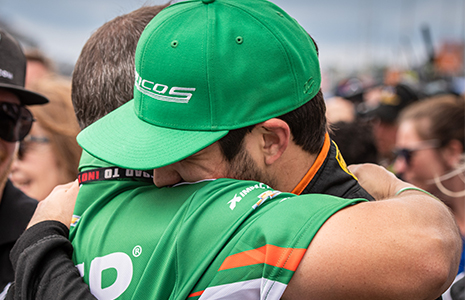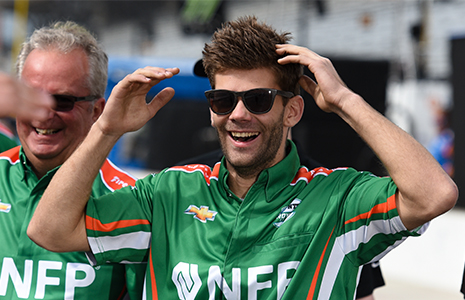INDIANAPOLIS – After enduring the “most emotional 48 hours” of his 23-year-old life, Kyle Kaiser prepared to take the green flag on the most pressure-packed four laps of his career Sunday at Indianapolis Motor Speedway.
All he was thinking about Sunday was the time needed in the Last Row Shootout to qualify his sponsor-less No. 32 Juncos Racing Chevrolet in the 103rd Indianapolis 500 presented by Gainbridge.
Kaiser didn’t allow his mind to wander about the driver he was trying to bump from the 33-car field, two-time Formula One champion Fernando Alonso.
 “I didn’t think about that,” Kaiser said. “I knew the time I had to do, and I went out and gave it all I had.”
“I didn’t think about that,” Kaiser said. “I knew the time I had to do, and I went out and gave it all I had.”
When he knew he was in, Kaiser (shown at right hugging a crewman) thought of Alonso.
“It crossed my mind when I came across the bricks and finished the run,” Kaiser said. “I mean, that guy is probably the greatest driver of our era. That guy is unreal and very deserving to be in this race.
“It just shows that this place shows no favors to anybody. It doesn’t owe anybody anything. I learned that the other day in Turn 3 (crashing in Fast Friday practice). It doesn’t owe anybody any favors, no matter who you are and what you’ve done.”
Kaiser earned the spot with a four-lap average of 227.372 mph around the 2.5-mile oval compared to Alonso’s 227.353 mph. Instead of Alonso making his second Indy 500 start after leading 27 laps in his 2017 debut, it will be Kaiser rolling off the line in “The Greatest Spectacle in Racing” for a second time on May 26.
The margin was so close, Kaiser was unsure even as he crossed the line.
“Did we make it?” he said on the radio.
All he heard was his crew screaming.
“I started crying when I heard the yelling,” Kaiser said.
After a Friday crash took the team’s all-white, sponsor-less primary car out of the equation, the team toiled for about 40 consecutive hours to put another car together. As the exhausted crew celebrated on pit road, emotional team owner Ricardo Juncos exhaled.
“We put everything on the line,” Juncos said. “You don’t want to crash again. We had no more money to keep going. Imagine another crash? At the same time, you have to be fast. We didn’t practice (Sunday morning with the other Last Row Shootout contenders), so we didn’t know the pace. It was a lot of gambling here. We trusted ourselves.”
The Argentinian who came to the U.S. with $400 in his pocket in 2003 will have a car in the Indianapolis 500 for a third consecutive year. Kaiser finished 29th last year. Sebastian Saavedra was 15th and Spencer Pigot 18th in 2017, when the team made its NTT IndyCar Series debut.
Perhaps most importantly for a team that has been successful in Indy Lights presented by Cooper Tires and Indy Pro 2000 presented by Cooper Tires – the top two levels of the Road to Indy development ladder – Sunday’s dramatic run to glory could translate to sponsorship dollars that will not only help Juncos Racing in this race but further sustain the owner’s ambition of racing more in the NTT IndyCar Series.
“I hope so,” Juncos said. “We’re going to keep trying. I hope this is some momentum that we can carry on so we can find the money to continue to race in INDYCAR.”
 That his team was able to get a car ready for Kaiser to make the final, fateful run was considered a victory, Juncos said. The only relief he had before the run was the realization that Juncos Racing gave everything it had.
That his team was able to get a car ready for Kaiser to make the final, fateful run was considered a victory, Juncos said. The only relief he had before the run was the realization that Juncos Racing gave everything it had.
“We had no more energy,” Juncos said.
He didn’t get much sleep Friday or Saturday night. Nobody did with that overnight thrashing.
Kaiser received a text from James Hinchcliffe, another driver facing the same precarious Last Row Shootout challenge. The Arrow Schmidt Peterson Motorsports driver wondered with Kaiser who the three qualifiers would be out of six in the running.
Kaiser texted a reply: “As long as it’s you and me, I don’t care.”
Hinchcliffe, who failed to qualify for last year’s Indy 500, went out first and had a solid four-lap average of 227.543 mph that would hold up for 32nd on the starting grid. Max Chilton and Alonso made their runs to fill the field. Sage Karam bumped Chilton to put Alonso on the bubble. Rookie Patricio O’Ward came close but just missed supplanting Alonso with an average speed of 227.092 mph.
That left Kaiser, who knew his first two laps were faster than 227 mph and sensed he could pull this off.
The 2017 Indy Lights champion from California couldn’t compare Sunday to anything he had experienced in racing, especially when he rolled down pit road to be reunited with his crew.
“It felt like we qualified on the pole when I came in,” Kaiser said.
While motorsports legends McLaren and Alonso tried to comprehend and accept what went wrong, the small team and young driver who persevered displayed the kind of genuine appreciation for their accomplishment that reminded why the Indianapolis 500 is so special.
“It means everything,” Kaiser said. “This is May, right?”